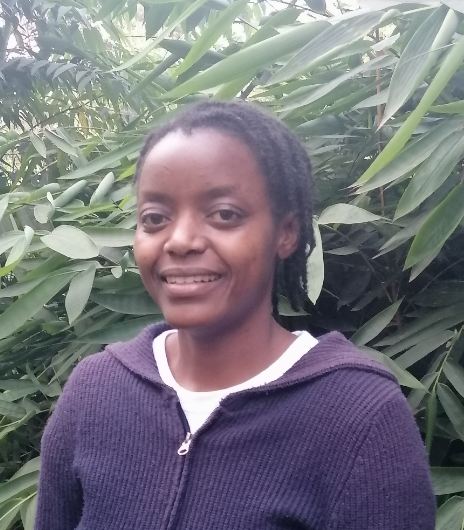
January 29, 2021, by Andrew Edwards (Ed)
How does rice reproduce when it’s hot? – An interview with Maureen Ng’ang’a
Maureen Ng’ang’a is a second-year PhD student on the UoN-Rothamsted Graduate Centre for International Agriculture scheme. Her project is entitled ‘TempR: Developing reproductive resilience to heat stress in rice’. Her supervisors are: Dr. Sigrid Heuer (RRes), Prof. Zoe Wilson (UoN) and Prof. Erik Murchie (UoN).
Why did you decide to do a PhD? What were you doing before?
In recent years, recurrence of extreme weather conditions has adversely affected global food production. Climate change poses a major threat to agricultural production and is synonymous with food insecurity and decreased crop yield. To adequately address the challenges facing crop production in a changing climate, I was keen to enrol on this PhD programme to pursue my research interests in plant genetics and molecular biology.
Prior to this, I was working at the International Maize and Wheat Improvement Center (CIMMYT) in Kenya. I was involved in developing maize varieties tolerant to different abiotic and biotic stress conditions.

Photo by Daniel Nainggolan on Unsplash
Why did you choose this particular scheme?
I’m interested in understanding how plants adapt to different environmental conditions. To effectively address the adverse effects of climate change on agriculture and food security, there is a need to develop climate resilient crops. This PhD provides a platform to realise my ambition of developing high yielding stress-resilient rice germplasm for exploitation in breeding programs, as well as studying the molecular basis of developmental and adaptive traits which can be translated to other crops.
I am delighted to be making my contribution towards developing innovative solutions to improve agricultural productivity and food security; the overall aim of the UoN-Rothamsted scheme.
Tell us about your research. What do you study? Why is it important?
In flowering plants, the reproductive phase is the most heat-sensitive developmental stage. High temperature stress during this stage induces irreversible damage on reproductive processes, which leads to male sterility. Due to failed fertilization, there is a decrease in seed set and grain yield.
My research project seeks to understand the genetic and molecular basis of reproductive heat tolerance in rice for application in crop improvement programs. This will involve using natural variation in a rice mapping population to identify genomic regions associated with heat tolerance during the reproductive stage. Molecular tools, transgenic and gene edited lines will be used to elucidate the molecular mechanisms of heat responsive genes during the reproductive stage. This will contribute to identification of reproductive and adaptive traits that can be exploited in developing high yielding rice germplasm with enhanced tolerance to thermal stress.
How do you explain your research to ordinary people?
Farmers around the world experience significant yield losses due to extreme weather events. A major constraint in rice production is heat stress, where temperatures above the critical threshold during the flowering stage cause reproductive failure and decline in grain yield.
Though the male reproductive organ of rice plant is extremely sensitive to high temperature, there does exist a wide genetic variation in reproductive heat tolerance among different rice varieties. This diversity can be explored, and then exploited, to develop climate resilient rice germplasm. To achieve this, I am identifying regions within the genome that cause high reproductive heat tolerance in rice plants. I will then characterize the molecular mechanisms of the heat responsive genes in the male flowering organs.

Photograph by Zoe Wilson
How has your first year gone? Any highlights or successes?
I have been writing my literature review, planning and running assays for different research objectives and taking training courses. Much of the time has been dedicated to thesis writing and detailing experiments.
Has undertaking a PhD been different from other degrees you have done? How so?
Through my research project, I’m practically applying concepts acquired during my undergraduate and graduate studies, but I can then proceed to further discuss the research findings. This entails proper planning, finding gaps in literature, learning from others and working independently, as well as networking and collaborating with others in the research field.
What have you learnt through your first PhD year?
Looking back, covering relevant and current literature is important in achieving the research objectives. Along with this, planning and prioritizing activities, as well as documenting and organizing your work, will help keep track of different tasks.
How do you cope with the pressure of doing a PhD?
To unwind from the lab and computer I enjoy skipping and taking walks.
No comments yet, fill out a comment to be the first

Leave a Reply